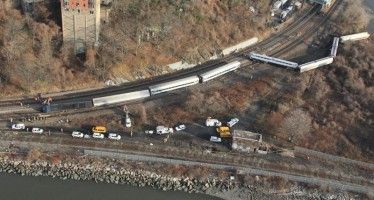CARB Vote Full Of Self Congrats
DEC, 20, 2010
By DAVE ROBERTS
“This is the end of the beginning,” declared California Air Resources Board (CARB) member Ron Roberts on Thursday before the board approved a plan they have been working on for four years that’s designed to help save the planet from the potential environmental disaster of man-made global warming. But skeptics may see it more as the beginning of the end for California as cap and trade regulations further wreck its feeble economy while doing nothing to affect the globe, which didn’t need saving in the first place.
Befitting the self-congratulatory, historic air permeating the daylong, drag-out meeting in the packed Byron Sher Auditorium, Gov. Arnold Schwarzenegger chose to take one of his final bows, dropping by to defend his baby: AB32, the California Global Warming Solutions Act of 2006, whose major component is cap and trade.
“I campaigned in 2003 about that I want to show California that we can protect both the economy and the environment,” said Schwarzenegger. “It’s a challenge to do that. There’s no doubt about that. But where there’s a will, there’s a way. We passed some really good legislation and did some great things environmentally. One of the things I’m most proud of is AB32. It’s controversial. Some people don’t like it. That’s OK, people can have different opinions. But one thing we know for sure is AB32 was challenged by outside interests, who put millions of dollars in the last election. And Proposition 23, which was meant to take out AB32, was defeated overwhelmingly by 22 percent.” He was interrupted by applause. “That shows you a huge majority of Californians are big believers in AB32.”
Schwarzenegger then made the case that instead of being a drag on business, the emission-reducing regulations will actually lead to an economic boom. “In this downturn, the biggest recession since the Great Depression, the real jobs we are creating right now are green jobs,” he said. “Since 2006 green jobs have been created 10 times faster than any other sector. We have been approving one solar plant after another. Billions of dollars are being poured into California in green technology. There’s great benefits.
“We have to be sensitive, because it is an economic downturn. This Air Resources Board knows they have to be sensitive. But we have to reach our goal by 2020 of reduction (of greenhouse gas emissions) by 25 percent. This is what makes us the leader. We have a budget crisis. We are also known for being great leaders in bio and green technology. Someone has to make it a reality. The people you see here make this a reality. I know today that we will have a reduction of 25 percent of greenhouse gases by 2020.” Schwarzenegger was given a standing ovation from the board and most of the crowd as he left.
It remains to be seen whether Schwarzenegger will be viewed in 2020 as a prophetic hero or an enviro-dupe, but many are concerned that slapping a plethora of complex regulatory burdens and costs on California businesses and residents will take a toll on this staggering state. Two California State University, Sacramento economics professors predicted in a 2008 study that AB32 will result in California losing more than a million jobs, an additional cost of nearly $50,000 to small businesses and nearly $4,000 in costs for the average family.
“[T]he potential loss of output, jobs, indirect business taxes and labor income is substantial and significant,” Sacramento State professors Sanjay Varshney and Dennis Tootelian said in a press release. “[C]onsumers will be forced to cut their discretionary spending by 26.2 percent. … the average annual loss in gross state output from small businesses alone would be $182.6 billion, approximately a 10 percent loss in total gross state output. Lost labor income is estimated to be $76.8 billion, with nearly $5.8 billion lost in indirect taxes. This decline in revenues will have a severe impact on future state budgets.”
Perhaps a dozen of the more than 100 speakers at the meeting share the professors’ concerns about the dire economic impacts. Most prominent among them was a group of Hispanic business owners, who told CARB that many small businesses are barely hanging on as it is, and that additional regulations will bury them.
“I’m extremely worried that the action will have a direct and detrimental impact on my business,” said Juan Carlos Delacruz, who owns a car lot in Los Angeles. “It will force costs to go up. People can’t afford new cars and higher gas prices. Under cap and trade they will keep them longer. We are in a major recession and unemployment is sky high. What are you going to do when these energy efficient cars don’t happen and we don’t meet our goals? It seems more like punishment than inducement.”
Steve Gandola, president/CEO of the Sacramento Hispanic Chamber of Commerce, seconded that, saying, “As energy costs increase, our small businesses will be hit by direct costs. They are operating on such small margins, barely in the black. Any increase in costs can send them into the red.”
But CARB Chairman Mary Nichols assured them that the new energy regulations will actually save their businesses’ money. “I think it’s been repeatedly demonstrated that when the electric utilities are put in a position where they are required to save electricity, they offer services to actually help their customers save on energy and on their bills,” she said. “That’s the biggest element of this program.
“I was at a small business makeover. The local utility SMUD was there to sign up every willing business owner to put equipment in their buildings to work with them to not only install but finance the installation of new equipment that would be paid off over time in lower utility bills. I can’t promise you for each and every business that that’s what’s happening today. This is what we have to make happen in the future. That’s the only way we can achieve the result with AB32. Otherwise there’s no point in doing this program. The purpose is to make California more competitive and energy efficient. We have got a lot of work to do to implement this program successfully.”
CARB’s economic analysis of the AB32 plan concludes that it will not worsen California’s growth rate: “If the Scoping Plan were not implemented, California’s economy would grow at an annual average rate of 2.4 percent between 2006 and 2020, with fuel expenditures increasing at an annual rate of 1.7 percent. By contrast, when the Scoping Plan measures are in place, increased investment in efficient buildings and technologies and in advanced fuels pays off: the economic growth rate remains 2.4 percent per year but fuel expenditures are reduced 4.9 percent and GHG (greenhouse gas) emissions reduced by 15 percent.”
The one thing everyone could agree on is that the cap and trade plan to reduce 273 million metric tons of CO2 emissions by 2020 incredibly complex as it seeks to change the way California businesses do business. The next year will spent hammering out the details of annual emission caps; banking, trading and auctioning of emission allowances by business sectors; offsets, offset protocols and registries; linkage with trading systems in New Mexico and Canada; reporting regulations and monitoring, among other things.
Related Articles
Covered CA blames cronyism on Obamacare scramble
In an embarrassing new black eye for Covered California, the state’s implementation of Obamacare, the health exchange, has admitted it
Railway safety comes at high price
Last Sunday, a Metro-North train in New York derailed, killing four passengers and injuring 67 others. Apparently the train engineer had
Will School Block Grants Replace Earmarks?
MAY 3, 2011 By WAYNE LUSVARDI In a February report, the Legislative Analyst’s Office charged that “virtually every aspect of K-14




